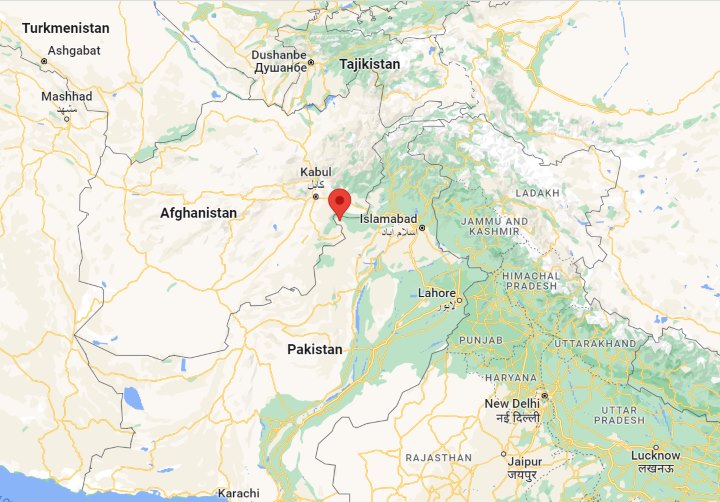

Parachinar is a Shia majority area in a Sunni Pakistan on the Af-Pak border
At least seven people have died and 38 injured in armed clashes between Sunnis and Shia in the Parachinar area of Khyber Pakhtunkhwa province in Pakistan over the weekend. The volatile region shares a porous border with Afghanistan with free movement of men and weapons.
Violence broke out between Shias and Sunnis over land issues last week in which heavy weapons were used to attack each other over many days. Dramatic videos show continuous firing taking place in the region. Many tweets say that the internet has been suspended in the area.
A contrarian view says that clashes are happening because the Tehreek-e-Taliban Pakistan (TTP) militants, who are based in Afghanistan, entered the province and started usurping land belonging to the Shias, deepening the existing Shia-Sunni divide in Pakistan.
The Parachinar area of Khurram district in Pakistan’s Khyber Pakhtunkhwa is one of the few regions to have a Shia majority in Pakistan – where the minority Muslim sect has been under attacks by Sunni terror groups like Laskhar-e-Jhangvi (LeJ) and the Sipah-e-Sahaba. After days of sectarian clashes, Shia groups held press conferences and condemned Prime Minister Shehbaz Sharif’s government for letting the situation be.
Shia leader Raja Nasir Abbas Jafari, secretary general of Pakistan’s biggest Shia politico-religious party – Majlis-e-Wahdat-ul-Muslimeen, warned that the attacks on the Shias are being launched from across Afghanistan. He said: “Militants are using advanced firearms that local residents do not have. The flow of advanced weapons through Afghanistan is a prelude to a major war”.
He added that Shia teachers and labourers are being killed by terrorists who entered Pakistan after breaking down the border fencing on the Durand Line. The Shia scholar blamed the Sharif government for turning a blind eye to the attacks on Shias and alleged that the country is promoting a Shia-Sunni divide for political interests.
In a separate press conference in Karachi, another Shia leader, Allama Syed Nazer Abbas Taqvi issued a warning: “On the issue of Parachinar, be prepared… pay attention to the issue of Parachinar. Because these are Shias, there is no political party. If this fire breaks out, it will reach the streets of Pakistan and then it will not be controlled”.
The Shia leaders also warned Pakistan against a looming civil war in the country if the anti-Shia sentiment was not controlled.
Minority Shia Muslims have been under sustained attack in a Sunni-dominated Pakistan for at least three decades. Thousands have been killed through targeted assassinations and suicide bombings.
This is the second time that Shias have been attacked in Parachinar in just a couple of months. In May several Shia teachers were shot dead at the Israr Shaheed High School after which the community staged protests and demonstrations against the Shehbaz Sharif government.
The attack on Shia school teachers had caught attention among Shia groups across the globe. In India, Shia cleric and general secretary of the Majlise Ulamae-Hind, Maulana Syed Kalbe Jawwad Naqvi, drew the attention of the UN. He said: “Shia genocide continues in Pakistan. The government of Pakistan and international organisations have failed to stop it. Terrorists entered a school and killed seven teachers, which shows the anti-education mentality of terrorists”.
The picturesque town of Parachinar on the Af-Pak border has often been called “Little Iran” because of Tehran’s influence among the region’s Shias.
A few years back, many young Shia men joined the Shia militant organisation – Zainabiyoun Brigade, created by the Iranian Revolutionary Guards Corps (IRGC) and went to Syria to fight in support of Shiite leader Bashar al-Assad. Though, initially Pakistan had no issues with its Shia men sauntering off to fight in Syria, it has lately begun to realise that the Shia fighters could pose a threat to a nation which is reeling under attacks by men that it had once used as “strategic assets”.
The homegrown Sunni terror groups and the foreign-returned Shia fighters who sharpened their skills in the Syrian conflict might soon end up creating a new battlefield in an unstable and chaotic Pakistan.
India decisively asserted its military superiority over Pakistan during this month's brief but intense conflict,…
Trade associations and local business groups in Pakistan-occupied Gilgit-Baltistan (PoGB) launched an indefinite protest on…
A human chain and protest march was organized by various organizations in front of the…
The United States on Saturday announced the expansion of its security partnerships with India through…
Highlighting the use of indigenous platforms during Operation Sindoor, Chief of Defence Staff (CDS) General…
Congress MP Shashi Tharoor on Friday (local time) said that Colombia will issue a statement…